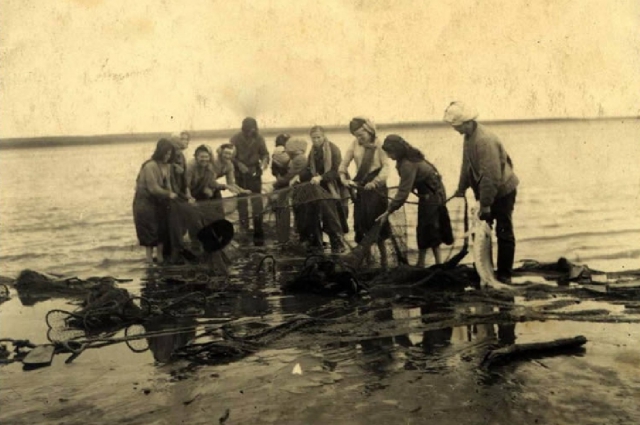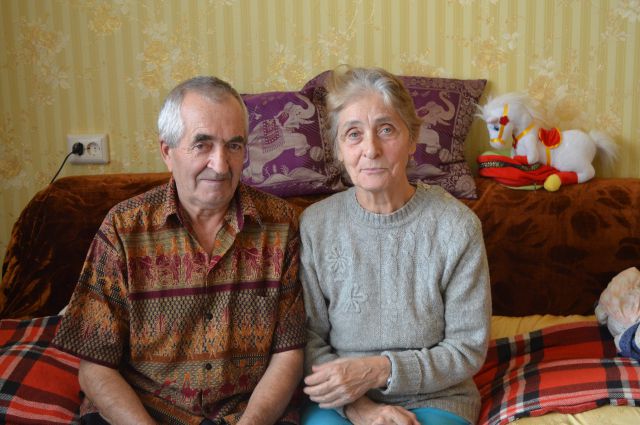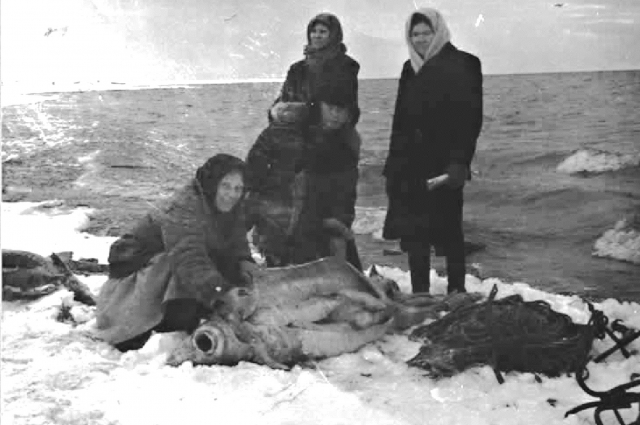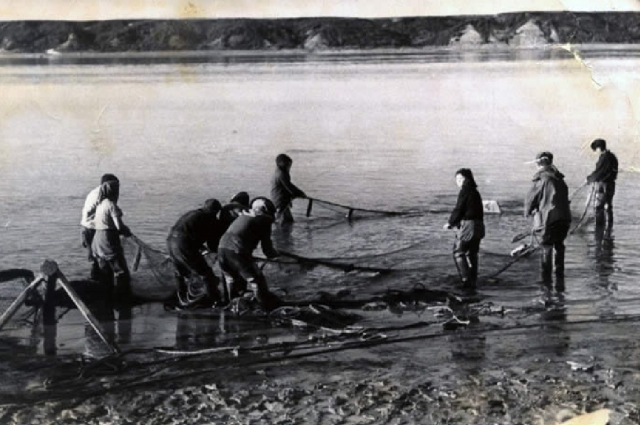









The story of Alexander and Polina Bauer from Agapitowo
At the beginning of the war the Soviet power applied preventive measures against the Volga-Germans. For fear of the possibility that they might defect to the German side, about 3 millions of people were determined for resettlement to remote territories of the country. In 1941-1943 about 1 million people were deported to the Krasnoyarsk Territory alone, 77.000 of them were Germans. The most abominable and most unhuman deportation in the whole history, however, was the deportation to the very north. Thousands of people died from hunger and cold on Taimyr Peninsula.
„Three Finns returned from Igarka and reported harrowing details: „ …along the right riverbank of the Yenissey, near the settlement of Agapitovo, we saw a little camp, tents, where people were lying with their bodies frozen to tent poles and ground, mainly women and children, but less older people. In the tents there were neither stoves nor fire wood ; dead bodies were lying all-around.

Germans in the Taimyr Region. Photo: AiF on the Yenissey
Nonetheless we found a „living skeleton“, from which we were able to learn that near the freezing up of the river Yenissey about 500 people were delivered to this place by ship, mainly Germans from the Volga Region and the Baltic countries. They provided them with just a couple of tents and some foodstuffs. We got to Igarka and, immediately upon our arrival, informed the officers on duty with the NKVD special commandant’s office about what we had seen.
From their conversation we could guess that the special contingent delivered to Agapitovo had simply been “forgotten” by the authorities. Four months later, on our way back, we did not meet there any living soul anymore“.
These lines originated from the diary of the Latvian Ruta Yankovich, who was deported with her mother and brother to the settlement of Ust-Khantaika in the district of Dudinka in 1941.
Everything that Ruta is writing about is plain truth. Yet it turns out that two human beings survived that time in Agapitovo after all – Alexander and Polina Bauer.

In 1941 Paulina was 3 years old, Alexander 7. Until today the two Volga Germans, people from Krasnoyarsk since long, are not in a position to give a reply to the question, how they managed to survive.

Germans in the Taimyr Region. Photo: AiF on the Yenissey
„They came to arrest my father in July 1941, we were not supposed to see him again afterwards, - Alexander recalls. – And on the 28th of August the authorities issued the order to deport all Germans from the Volga Region. Our family, 10 people in all, was freighted on a hay-cart and then taken to the train station. „You do not have to take anything along, they will give you anything you need there; it won’t be for long – just as long as the war is on”, - they told us. Hence, we set off scantily dressed and with just little luggage“.
On the train station the special contingent was loaded on freight-cars, which were elsewise used to transport cattle, and then they were taken along the southern route via Alma-Ata to Krasnoyarsk Territory. During the trip it got bitterly cold, navigation was stopped and the people were relocated in different villages. In the summer of the following year the people gathered at the river port; they were asked to board the „Josef Stalin“, which went to the north.
„The ship was filled to overflowing, - Alexander continues. – Our family had found a place on the lower deck, right beside the gangway. We did not know where they intended to take us to. Every now and then the ship was mooring, and a part of the people was asked to disembarked. When it was finally our turn, we got caught up in confusion. The riverbank was completely deserted, not a soul as far as the eye could reach. There was just a hunting lodge, occupied by a fisherman whose family name was Agapitov, and a shed with some equipment. Thus, the settlement was called Agapitovo“.

Germans in the Taimyr Region. Photo: AiF on the Yenissey
About 500 people and a certain amount of foodstuffs were landed here: a few bags of pearl barley and flour, which immediately soaked through, for there was high tide on that very day. Nobody was in possession of warm clothes, they even had nothing to make at least a watery soup from. The men immediately set out to build dug-outs, but the ground was all frozen, so that they could not dug deeper than half a meter. They were forced to thaw the ground by means of camp fires.
The people began to die almost instantly – at first from scurvy, later from hunger. Locals showed them how to boil out the twigs of fir trees and drink the brew; it actually helped against scurvy.
By the year 1945 Alexander and his mother were the only family members left.
Three aunts had poisoned themselves at the same time with uneatable plants,
which had looked very similar to carrots. They were found at the lakeshore,
where they had eaten them. The remainder of the people gradually died from
hunger.
The dead bodies were not buried; they were taken out of the dug-outs and put
them into a small hole – one layer of corpses, one layer of twigs… Later
wolverines or foxes were sneaking up and tore the dead into pieces.
Alexander was saved by the circumstance that a hunter living there showed him how to hunt hares and partridges. There were so many of them that you could not count them. The boy delivered them to Igarka; in so doing he was able to feed himself and his mother. .
„In the third year they sent a woman teacher to Agapitovo and organized a place for the children to attend school, - the man tells us. – She was a very young Russian woman, and we – Germans, Letts, Estonian did not understand a single word of Russian. When she gave us the very first lesson, she tried to explain something to us. However, we remained silent all the time. She probably guessed that we did not understand her and started to cry heartbreakingly. And – we started sobbing, too. Then she wrote a couple of big letters on the blackboard - A, O, U – and began to sing.
We joined her in singing. And this is how we successfully completed the basic primary school within three years. Afterwards we attended the boarding school in Igarka. Behind the building there was the commandant’s office, where we had to go and get registered once a month. Any time we came in we were received with the words: „Oh, the Fascists arrived!“ – „Wait patiently, children!“ – our educators tried to calm us, - soon everything will change“. After having finished boarding school, I did not return to Agapitovo. But Mum stayed there until 1956, the year when we were rehabilitated“.
The fates of Alexander and Paulina intertwined in 1964. They met in Igarka and never disbanded. By irony of fate they had both lived in Agapitovo before without knowing of each other.
„I was just three years old and can hardly recall any details, - says Polina. The vast bulk of what I know is from the memoirs of my relatives. We were six of us, when we arrived here – three adults and three children: me, my one-year old sister and my little brother, who was just six month at that time. He was born during the trip and died almost instantly after his birth. For a period of three years we, the children, were kept sitting in our dug-out on a plank bed, without going outside.
Every day Mum, who had lost a lot of weight particularly after having delivered my little brother, had to fell trees, while grandma stayed with us. I remember that I was all covered by ulcers; that was very painful, and the scars can still be seen today. Some fortunate coincidence helped to cope with this situation, as well. Grandpa was a true master in stitching leather. Hence, in the third year, they asked the whole family to come to Igarka, for this was the place, where all the cattle was taken for meat production. Due to this circumstance Mum, my sister and my grandfather stayed alive. Mum got 94 years old; she died here in Krasnoyarsk.
After Alexander and I had got married and our daughters had been born, we intended to go back to our home village. We even presented the authorities with all necessary documents, but they did not give us the permission. In spite of our rehabilitation we were not allowed to return to our historic home – in any other region – yes, but not home. When the borders were opened, many people left for Germany.
We thought of it, as well. But since I had been born in Russia, had gone through so many adversities here – my historic home was, in fact, Russia. It is true that here we had been called “fascists”; Russian children had spat into our cookware, in which grandma used to cook our meals – and we then ate it, for there was nothing else to eat. In Germany, however, we would have been newcomers, strangers, too. And for this reason we decided to stay here”.
Photos by the author and from the archives of the regional „Memorial“ organization
Svetlana Khustik
AiF on the Yenissey, 31.10.2014